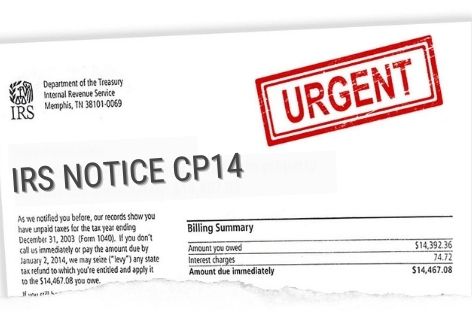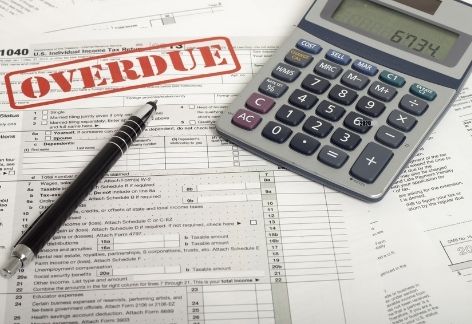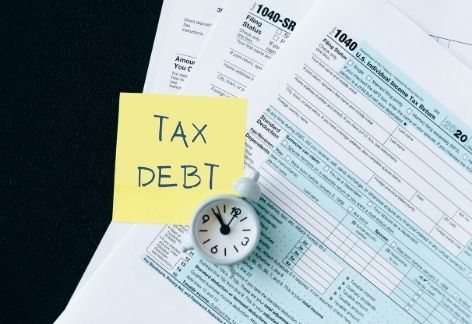You've received an IRS Notice CP14. What does this mean and how should you respond? Here is what you need to know.
[lwptoc]
Most letters from the IRS don’t bode well – but IRS Notice CP14 is an exceptionally notorious example, as it means that the IRS has found that your tax account currently has a balance due with the federal government. In other words, you have a tax debt to settle due to unpaid taxes.
Don’t panic.
This is not an indictment. Even on the IRS’s part, simple mistakes and miscalculations can lead to a small tax debt. If you owe unpaid taxes, then your first steps should be to take a deep breath and read on.
How could this have happened?
There are a few reasons a taxpayer may incur a tax debt with the IRS, even after sending in their quarterly checks or getting their taxes withheld on every paycheck. Mistakes on your tax return, for example, can lead to more taxes than you might have expected to pay.
Thankfully, Notice CP14 is not a last warning from the IRS. Most of the time, your IRS Notice CP14 will include a few key bits of information that are critically important:
-
-
- The date your tax debt was assessed.
- The exact amount due.
- The due date for you to cover said amount.
-
What Will the IRS Do Next?
It will wait for a response. For the IRS, the best-case scenario is that a taxpayer receiving the notice will pay their due balance. You can do so via a mailed check, by visiting an IRS office, or, most conveniently, over the internet. No fuss, no muss, and you’re avoiding any potential penalties or interest rates that might otherwise be headed your way.
If you ignore the IRS Notice CP14 or wait too long, the IRS will begin applying pressure on your account by raising your debt with monthly penalties. The monthly penalty for failing to pay your owed taxes by the due date is 0.5 percent, up to a cumulative 25 percent after fifty months. If you’re late by even a few days, that first 0.5 percent will apply.
In addition to penalties, your tax debt will begin to incur interest. The interest rate for a debt with the IRS depends on a quarterly rate change, which can be reviewed via the IRS’s newsroom.
How You Should Respond to IRS Notice CP14
As your debt grows, the IRS may resort to increasingly invasive collection efforts. Because these collection efforts can severely hamper your ability to gain financing and indirectly affect your credit, not to mention lead to future bank levies, it’s usually advised to work with the IRS (through an experienced tax professional) to pay off your debt as soon as possible.
With assistance, you can seek financing to pay off your tax debt. Under most circumstances, banks offer lower monthly interest rates than the federal government does.
Ignoring the IRS Notice CP14, or taking too long to respond, is a bad idea. If you feel that the IRS made a mistake, and if you can prove (or wish to prove) that you do not owe additional taxes, speak with a tax professional as soon as possible.
You do have the option of appealing your debt with the IRS in an independent appeals process, and if that fails, you can still take the IRS on in US tax court.
Note that litigation is not a preferred method for dealing with the IRS, especially if the debt is insignificant or if the details of the situation are rather straightforward. But if you feel a mistake has been made, discussing it with the IRS via a tax attorney or tax advocate may lead to the elimination of your debt.
Payment Plans
Alternatively, you should enter into a payment plan with the IRS as soon as you can. Entering into a payment plan with the IRS reduces your interest rate and monthly penalties and can even lead to a tax lien release (if the IRS has placed one on you).
Payment plans with the IRS are either:
-
-
- An immediate pay now plan;
- A short-term payment plan, lasting less than 120 or 180 days (after extension – paid in multiple lump sums);
- A long-term payment plan lasting more than 120 or 180 days (after extension – paid via monthly installments).
-
If you have not previously been in debt with the IRS, and have never defaulted on an IRS payment plan, then you can seek to get your penalties written off as a first-time courtesy. This way, your debt is reduced to what it was originally on the IRS Notice CP14.
Note that you can technically owe the IRS several times if you missed payments or made mistakes on your return on multiple occasions. You can consolidate these debts into one payment plan by speaking with the IRS.
If you are also late with your tax returns or have missed several tax returns, the IRS will inform you that you must file these as soon as possible before being allowed to enter into a payment plan.
Do not make the mistake of failing to file your return because you cannot pay your back taxes. Even if you’re in debt with the IRS, you need to continue to file your tax returns to be eligible for a payment plan.
Can’t Pay?
If your tax debt continues to grow and becomes unmanageable – or if a massive financial setback has you in dire straits, without the means to pay the government what you owe – then you’ve found yourself in a truly desperate position.
Thankfully, there are ways to negotiate for a reduced debt with the IRS. The first is to work with a tax professional to write up an offer in compromise.
This is a payment plan drafted by the indebted taxpayer to the IRS, based on what they are financially capable of paying monthly until the tax debt reaches its statute of limitations (10 years after the tax assessment date, plus tolling periods).
You can also use an IRS pre-qualifying tool to determine if you might be eligible. Note that this is no guarantee that the IRS will accept your offer. Your tax debt will continue to grow while the IRS deliberates your offer.
If you need immediate reprieve from the IRS’s collection efforts, you can also consider filing as currently not collectible. If eligible, the IRS will halt any levies against you until your financial situation improves. Your tax debt will not age during this time (but will continue to accumulate penalties and interest). Understanding the audit timeline for IRS investigations is crucial. Typically, these audits can take several months to complete, depending on the complexity of your case. Staying informed throughout the process can help mitigate stress and prepare you for any required documentation.
If you have received an IRS Notice CP14, contact the professional tax attorneys at Rush Tax Resolution today.











